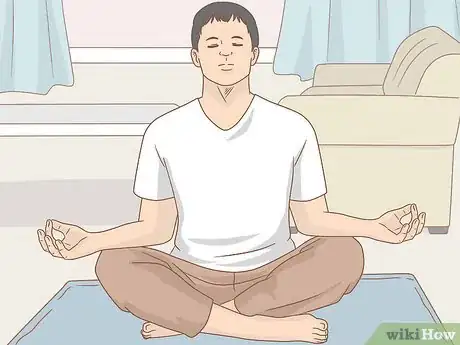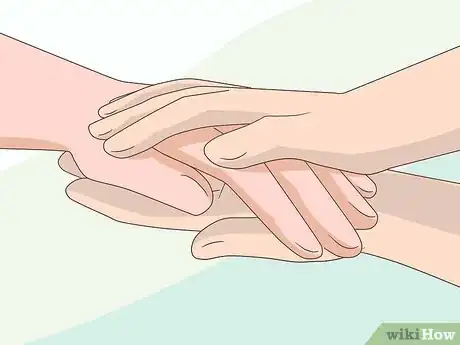This article was co-authored by Rebecca Tenzer, MAT, MA, LCSW, CCTP, CGCS, CCATP, CCFP. Rebecca Tenzer is the owner and head clinician at Astute Counseling Services, a private counseling practice in Chicago, Illinois. With over 18 years of clinical and educational experience in the field of mental health, Rebecca specializes in the treatment of depression, anxiety, panic, trauma, grief, interpersonal relationships using a combination of Cognitive Behavioral therapy, Psychodynamic therapy, and other evidence-based practices. Rebecca holds a Bachelor of Arts (BA) in Sociology and Anthropology from DePauw University, a Master in Teaching (MAT) from Dominican University, and a Master of Social Work (MSW) from the University of Chicago. Rebecca has served as a member of the AmeriCorps and is also a Professor of Psychology at the collegiate level. Rebecca is trained as a Cognitive Behavioral Therapist (CBT), a Certified Clinical Trauma Professional (CCTP), a Certified Grief Counseling Specialist (CGCS), a Clinical Anxiety Treatment Professional (CCATP), and a Certified Compassion Fatigue Professional (CCFP). Rebecca is also a member of the Cognitive Behavioral Therapy Society of America and The National Association of Social Workers.
There are 9 references cited in this article, which can be found at the bottom of the page.
This article has been viewed 56,373 times.
Are you sick of feeling down and ready to feel more positive and upbeat? Maybe you are struggling to feel happy go lucky due to personal issues or problems that you have been avoiding or have not addressed. Happiness comes from making positive life choices, and is not necessarily attached to having material objects or wealth.[1] Often, you can cultivate a more positive outlook in life by taking care of yourself and by treating others around you well.
Steps
Maintaining a Happy Go Lucky Attitude
-
1Live in the moment. While maintaining a certain level of control over your life is important for maintaining a positive state of mind, you should also try to live more in the moment. This means letting go of things you cannot control and embracing spontaneity. Living in the moment can add an element of excitement and engagement in your life that you may have been missing.[2]
- One way to live more in the moment is to create a bucket list of five to ten things you have always wanted to do and set a timeline for doing them. Keep the items reasonable, as you want them to be things you can achieve. Your list may have things like “traveling solo for a month” or “competing in the slam poetry competition at school”. Focus on things you can achieve and then pursue them.
-
2Focus on the positives, even in a challenging situation. You should also try to develop a habit of looking on the bright side of things. Though it’s important to acknowledge that bad things happen, you do not need to negative to take over your life. Instead, focus on the positives. Ask yourself, “Is the situation really as negative as I think it is?” and “Can I look at this situation in a more positive way?”[3]
- It may also help you to view bad situations as part of a learning experience, where you can gain insight into yourself or into others. Thinking about what you can learn, rather than shutting down or freaking out, can allow you to approach the situation positively.
Advertisement -
3Embrace positive affirmations. To boost your sense of happiness, you can start your day with one to two positive affirmations. These affirmations could be simple "I" statements about something you are happy about or grateful for, as well as statements about positive things you intend to do that day. For example, you may look in the mirror in the morning and say, "I am powerful and strong" or "I am going to do exciting things today."[4]
- You may also want to put up inspirational posters and visuals that contain positive messages in your living space or your work space. This way, you can look at these messages when you are having a low point in your day or struggling to be happy go lucky as a reminder to stay positive.
-
4Value your time and use it in positive ways. Valuing your time means not spending time on people or activities that are going to suck away your energy and zest for life. Surrounding yourself with positive influences will help you maintain a more positive outlook. Avoid wasting time on negative things or activities that may be harmful to your happiness. Instead, use your time to cultivate positivity and joy.[5]
- You may want to think about individuals around you who tend to bring negativity into your life and try to distance yourself from them. You may seek out individuals who have a sense of contentment and confidence and spend more time with them instead.
- You can also devote more of your time to activities that will allow you to feel good about yourself, from exercising more to doing hobbies you enjoy. Using your time for positive things will help you maintain a happy go lucky attitude.
Taking Care of Yourself
-
1Maintain a healthy diet. Your sense of happiness is directly influenced by how well you take care of your body. Eating a healthy nutritious diet will ensure you feel energized for the day and your body is feeling at its best. Your diet should be balanced, with good sources of protein, carbohydrates, and dairy as well as fruits and vegetables.[6]
- You should create a meal plan and go shopping every week for fresh produce. Try to stick to the items on your grocery list so you are not tempted to get unhealthy foods.
- If you have a hard time going grocery shopping every week due to your busy schedule, you should opt for the healthy option when you go out to eat. Look for an option that contains vegetables and healthy sources of protein, such as tofu or lean meats.
-
2Sweat at least 30 minutes to one hour a day. Set aside time in your schedule to work up a sweat for at least 30 minutes to one hour a day. Exercise helps to create endorphins and contribute to a more positive outlook on life. Working out will allow you to release any stress or anxiety you may be struggling with and feel refreshed by the end of your run, jog, or exercise class.[7]
- You may have an exercise class you enjoy doing on a daily basis or several times a week. Or you may prefer to run or jog for exercise. Whatever you decide to do, make sure you let yourself sweat on a consistent basis to boost your mood and stay healthy.
-
3Spend time outside at least 15 minutes a day. Try to fit in some outside time to your routine, whether this is a short walk in a green space near the office or a walk in the sun on a nice day. Exposure to sunlight, and Vitamin D, can help to boost your mood and your health. Studies have shown that spending time in green spaces, with lots of plants and natural beauty, can also improve your outlook and your mood.[8]
-
4Keep a regular sleep schedule. Research has shown that not getting enough sleep every night can lead to mood swings, depression, and disease.[9] You should aim to get at least eight hours of uninterrupted sleep a night. Create a sleep schedule where you go to sleep at the same time and wake up at the same time, as this will help keep your body balanced and make it easier for you to get a full night of rest.
- If you decide to nap, try to nap after 3 pm and for no longer than 30 minutes. Short naps should not affect your sleep schedule as long as they are 30 minutes or less.
-
5Meditate at least five to ten minutes a day. Meditation has been shown to have positive effects on your mindset and increase your sense of peace. Take five to ten minutes out of your day to sit in a quiet, secluded spot and do meditation. This can allow you to work through any stress or anxiety you may be feeling.[10]
- Close your eyes and breath deeply in and out of your mouth. Focus on calming your mind and inner peace. You can play soothing music in the background to help you stay focused and relaxed.
-
6Pursue a new hobby or skill. Maybe you’ve always wanted to try fencing or rowing, or you have always been meaning to get better at pottery or painting. Challenge yourself to learn a new skill or perfect an existing hobby. Often, trying something new can be motivating and inspiring. Enlist a friend to take a class in a new skill with you or pursue the hobby on your own.[11]
- You may want to pursue a new hobby or skill as a way to achieve a life goal. Striving for a specific goal or mission can give you aspirations and lead to greater happiness. Goals also give you a sense of purpose and bolsters your self esteem.
- You may ask yourself a few questions to help you find a new hobby or skill, such as, “What gets me excited and engaged?” “What have I always wanted to try in life?”
Forming Healthy Relationships
-
1Maintain close relationships with at least five individuals. National surveys have shown that maintaining relationships with at least five people that are close and fulfilling can lead to a greater sense of personal happiness.[12]
- You may count your romantic partner as one of these five people, as well as close family members. The idea is the stronger your ties are to other people, the happier you are. Healthy interpersonal relationships enrich your life and help improve the quality of your life. Having good relationships also gives you a sense of support when you are feeling down and a way to relieve stress or anxiety through spending time with those you care about.
- You may want to sit down and write out five people in your life that you are closest to. This could be friends, family, partners, spouses, etc. You should then consider how you can strengthen your relationships with these five individuals even more. Maybe you haven’t spoken to one friend in months or you have neglected your relationship with your partner. Make an effort to reconnect with that individual and stay connected.
-
2Offer assistance to friends or family in need. Being there for friends and family can also improve your mood and your quality of life. If you have a friend who is feeling down, reach out to them and try to cheer them up.[13]
- This could be something as simple as dropping by for a visit or going out for a coffee. If a family member is ill, bring them healthy food or medicine. Making an effort to be kinder and considerate to others can in turn help you feel better about your life.
-
3Show gratitude and appreciation to those close to you. Do this by expressing a sense of wonder and thankfulness towards people who support you in your life. Every day, to think of at least one thing for which you are grateful.[14] This could be the fact that your partner makes coffee for you in the morning or the fact that your morning commute is shorter that day. Displaying gratitude and appreciation will help you maintain a happy go lucky attitude.[15]
- When you have an ungrateful thought, try to replace it with a grateful one. For example, you may think, “My boyfriend forgot our anniversary,” but then you might remind yourself, “My boyfriend took me out for dinner last year and he has a lot on his plate right now.”
Addressing Issues or Problems in Your Life
-
1Think of any issues or problems that may be making you unhappy. Sometimes, it can difficult to feel happy go lucky when you are experiencing negative feelings due to a specific issue or problem. One way to feel better is to address this issue and try to resolve it so you can move forward. You may want to sit down and consider what might be bringing you down or bothering you. Once you address the issue, you can then brainstorm ways to resolve it.[16]
- For example, you may feel depressed due to losing your job. Once you acknowledge that this is the issue that is making you unhappy, you may be motivated to apply for other positions. You may also take some time to consider if you would be happier in a different career or in a different position. The lay off may be blessing in disguise and allow you to pursue a career you have always wanted.
-
2Write negative thoughts down in a journal. If you struggle with negative thoughts on a daily basis, you may want to try writing them down rather than keeping them inside. Try to make journaling a daily practice, done at night before bed or in the morning before you get ready for the day. Writing your thoughts down can be cathartic and allow you to release emotions you may be struggling with.[17]
-
3Speak to friends or family about your issues. You may also want to reach out to your support network and share your thoughts with friends or family.[18] Sharing your feelings and emotions can be a healthy way to process them and address them.[19]
- Avoid complaining or whining about your issues on a constant basis, as this will just place your negativity on those around you. Instead, try to talk one on one to friends or family and ask for advice about an issue you may be having. Practice active listening and show the person you are paying attention to what they are saying. Make the discussion feel more like a conversation, rather than a rant session.
-
4Talk to a professional. If your issues or problems are really getting in the way of your happiness, you may want to talk to a therapist or a counselor. Talking to a professional can help you work through your issues and feel supported as you try to maintain a more positive outlook on life.[20] Getting help from a therapist or counselor will often open the door to healing and happiness.[21]
- You can talk to your primary care doctor and get a referral for a therapist or seek out a therapist through a friend or relative who goes to good therapist.
- You can also speak to a counselor at your school or in your workplace to help you work through your issues and get one step closer to a happy go lucky attitude.
References
- ↑ http://www.mayoclinic.org/healthy-lifestyle/stress-management/in-depth/how-to-be-happy/art-20045714
- ↑ http://www.mayoclinic.org/healthy-lifestyle/stress-management/in-depth/how-to-be-happy/art-20045714?pg=2
- ↑ http://www.mayoclinic.org/healthy-lifestyle/stress-management/in-depth/how-to-be-happy/art-20045714?pg=2
- ↑ http://www.prolificliving.com/100-positive-affirmations/
- ↑ http://www.sparringmind.com/be-happy/
- ↑ http://greatist.com/grow/how-to-be-happy-long-term
- ↑ http://greatist.com/grow/how-to-be-happy-long-term
- ↑ http://greatist.com/grow/how-to-be-happy-long-term
- ↑ http://healthysleep.med.harvard.edu/healthy/matters/consequences/sleep-and-disease-risk
- ↑ https://www.psychologytoday.com/blog/meditation-modern-life/201309/meditation-will-make-you-smarter-and-happier
- ↑ http://www.mayoclinic.org/healthy-lifestyle/stress-management/in-depth/how-to-be-happy/art-20045714?pg=2
- ↑ http://www.sparringmind.com/be-happy/
- ↑ http://www.sparringmind.com/be-happy/
- ↑ Rebecca Tenzer, MAT, MA, LCSW, CCTP, CGCS, CCATP, CCFP. Clinical Therapist & Adjunct Professor. Expert Interview. 19 August 2020.
- ↑ http://www.mayoclinic.org/healthy-lifestyle/stress-management/in-depth/how-to-be-happy/art-20045714?pg=2
- ↑ http://www.sparringmind.com/be-happy/
- ↑ http://greatist.com/grow/how-to-be-happy-long-term
- ↑ Rebecca Tenzer, MAT, MA, LCSW, CCTP, CGCS, CCATP, CCFP. Clinical Therapist & Adjunct Professor. Expert Interview. 19 August 2020.
- ↑ http://greatist.com/grow/how-to-be-happy-long-term
- ↑ Rebecca Tenzer, MAT, MA, LCSW, CCTP, CGCS, CCATP, CCFP. Clinical Therapist & Adjunct Professor. Expert Interview. 19 August 2020.
- ↑ http://greatist.com/grow/surprising-benefits-therapy




-Step-2.webp)
-Step-1.webp)






































































